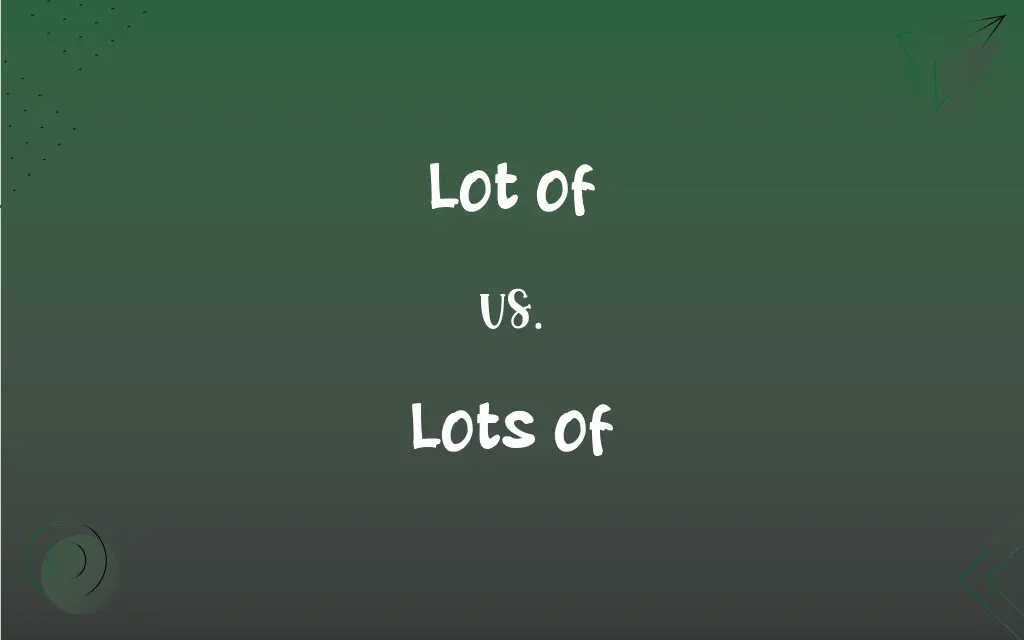Lot of vs. Lots of: What's the Difference?
Edited by Aimie Carlson || By Janet White || Published on February 6, 2024
"Lot of" and "lots of" are both expressions denoting a large quantity or number, with "lots of" being slightly more informal and emphasizing a greater abundance.

Key Differences
"Lot of" is a common phrase used in English to indicate a considerable amount or number of something. It's often employed in both spoken and written English. "Lots of," on the other hand, is a slightly more colloquial variant of "lot of," suggesting a larger quantity or degree. Both phrases are versatile and can be used interchangeably in many contexts.
In formal writing, "lot of" is often preferred due to its slightly more formal tone. This phrase is suitable for academic or professional contexts. Conversely, "lots of" conveys a more casual and conversational tone, making it a frequent choice in everyday speech and informal writing. Both expressions, however, communicate the idea of a substantial amount.
The phrase "lot of" is versatile, fitting well into various sentences without affecting the formality of the language. "Lots of," while equally adaptable, can add a touch of informality or emphasis to a statement. Both are used to quantify both countable and uncountable nouns, making them highly useful in diverse linguistic situations.
When it comes to emphasis, "lots of" can be seen as slightly more emphatic than "lot of." It's often used to stress the largeness or abundance of the quantity being referred to. "Lot of" is more neutral in its emphasis but equally effective in conveying a significant amount. Both phrases, therefore, differ subtly in the degree of emphasis they convey.
In the context of spoken language, "lots of" may be perceived as more emphatic and lively, adding a dynamic quality to conversations. "Lot of," while commonly used in speech, might convey a more measured or restrained tone. Both expressions, however, are widely accepted and understood in various forms of communication.
ADVERTISEMENT
Comparison Chart
Formality
Slightly more formal.
Slightly less formal, more colloquial.
Emphasis
Neutral emphasis on quantity.
Greater emphasis on the largeness of quantity.
Usage in Writing
Preferred in formal writing.
Common in informal writing.
Tone
Neutral, can fit into various contexts.
Adds a casual or lively tone to the language.
Suitability
Suitable for both spoken and written English.
More commonly used in everyday, casual speech.
ADVERTISEMENT
Lot of and Lots of Definitions
Lot of
A phrase indicating a significant amount or number.
I have a lot of work to do today.
Lots of
Indicating a great number or quantity.
There were lots of stars visible in the sky last night.
Lot of
Used to express a considerable quantity.
She read a lot of books over the summer.
Lots of
A colloquial expression for a very large amount.
We have lots of options to choose from.
Lot of
Referring to a large amount in a general sense.
There was a lot of noise coming from the street.
Lots of
Used to emphasize an abundance or plethora.
She has lots of friends in the city.
Lot of
Describing a substantial number of items or people.
A lot of people attended the concert.
Lots of
Describing a considerable amount in an informal context.
He's got lots of interesting stories to tell.
Lot of
Signifying a great extent or degree.
He showed a lot of enthusiasm for the project.
Lots of
Expressing a substantial degree or extent.
She showed lots of patience with the new students.
FAQs
Is "lots of" appropriate for academic papers?
It's less formal, so it's better suited for casual contexts.
Can I use "lot of" in formal writing?
Yes, it's suitable for formal writing.
Can I use them with uncountable nouns?
Yes, they're also used with uncountable nouns.
What does "lot of" mean?
It means a significant amount or number of something.
Are these phrases used with countable nouns?
Yes, both can be used with countable nouns.
Can these phrases be used in negative sentences?
Yes, in sentences like "I don't have a lot of time."
How is "lots of" different from "lot of"?
"Lots of" is more informal and implies a greater abundance.
Which is more common in spoken English?
"Lots of" is more common in casual, spoken English.
Can I start a sentence with these phrases?
Yes, both can be used at the beginning of a sentence.
Is "lots of" too casual for business emails?
It depends on the tone of the email, but "lot of" is safer.
Is there a difference in meaning between the two?
The meaning is similar, but "lots of" can emphasize more abundance.
Are they used in questions?
Yes, as in "Do you have a lot of homework?"
Can I use them with specific numbers?
No, they're used when the exact number isn't specified.
Are these phrases interchangeable?
In many contexts, yes, but consider the formality of the setting.
Is there a synonym for "lot of" and "lots of"?
"A great deal of" or "a large amount of" are similar.
Do they imply exact or approximate quantities?
They imply approximate, not exact, quantities.
Can I use "lots of" in a presentation?
Yes, if the presentation is informal.
Is "lot of" ever considered incorrect?
Not usually, but context and formality should guide its use.
Can these phrases be used with adjectives?
They're typically used with nouns, not adjectives.
Do "lot of" and "lots of" have plural forms?
No, they don't change in plural contexts.
About Author
Written by
Janet WhiteJanet White has been an esteemed writer and blogger for Difference Wiki. Holding a Master's degree in Science and Medical Journalism from the prestigious Boston University, she has consistently demonstrated her expertise and passion for her field. When she's not immersed in her work, Janet relishes her time exercising, delving into a good book, and cherishing moments with friends and family.
Edited by
Aimie CarlsonAimie Carlson, holding a master's degree in English literature, is a fervent English language enthusiast. She lends her writing talents to Difference Wiki, a prominent website that specializes in comparisons, offering readers insightful analyses that both captivate and inform.







































































